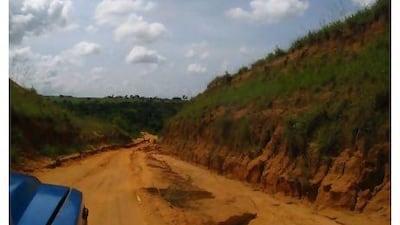"We've got a prima donna on board," Roger says, referring to a big African lady flaunting a manicure featuring fake pearls encircled by rhinestones affixed to each of her 10 fingernails. We've waded through mud to clamber onto a boat to cross the mouth of the Congo River into Angola only to find her on board.
I don't know what she's shouting. It might have something to do with several extra men that have jumped aboard a vessel meant for six passengers. They are also shouting; the boat's pilot, too. In a fit of impatience, I join in, yelling in English, "Come on, let's go!" The entreaty is lost in the din as the boat rocks in the shallow water.
Simple things tend to become complicated in Africa, like crossing a river. But then, this isn't just any river. The Congo has arguably seen more bloodshed than any other waterway on Earth. Long before the Second Congo War along its banks killed more than five million from 1998 to 2008, the river's figurative darkness, deep in the continent, had been a matter of historical and literary record.
Macabre connections aside, the Congo is also a mighty tap, discharging an average of 40,000 cubic metres of water into the Atlantic every second. Its course actually extends miles out to sea, visible on Google Earth like the jet of a jacuzzi. Only the Amazon exceeds its flow, and the Congo basin of four million square kilometres makes it the world's third largest river catchment.
It's already been a long day and it's not half over. We'd woken this morning at an immigration post of the Democratic Republic of Congo, having spent the night sleeping on the floor in front of the passport collection window. It was already late morning when the station chief, who insisted on approving our entry in person, finally appeared and stamped us into the country.
While waiting, we'd struck up a conversation with Blaise, the only DRC immigration officer who spoke decent English. "Do tourists pass through here very often?" we asked.
"Sometimes," Blaise replied. "There were a couple of Germans. I think that was two months ago."
On tracks of thick sand, through verdant grasslands with stalks tall as a man, a shared 4x4 took us from the border to the sun-baked city of Muanda, occupying a tiny strip of DRC coastline facing the Atlantic. At Banana, a point overlooking the Congo mouth, we went through another round of customs and immigration.
Summoned to a wooden shack to pay for the tickets (US$25 each; Dh92) for the 30-minute crossing, I saw something that both perplexed and repulsed. "You'd better go take a look at the pictures on the wall," I said to Roger, whom I'd left watching our bags near the boat launch.
Two photographs showed something resembling an old mannequin with paint bubbling and peeling from its surface, floating in a reedy pool of water - obviously the corpse of human being. Unable to translate the French written above the snapshots or coax a discernible explanation from the ticket seller, I sent Roger back to investigate. The body, he ascertained, was that of the captain of one of the boat company's vessels who'd been killed - the word they used was "killed", not "died", Roger said - and found in this state months later. I gathered it was a tribal or gang-related killing. Cripes.
So, here we are with the prima donna. The shouting finally stops and the pilot yanks the outboard motor into action. At a midway point in the journey, the interlopers disembark and a non-uniformed man demands an inexplicable payment of about $2 (Dh7) from each of the passengers. Everyone obliges except Roger and I, who respond with our customary refusal when faced with demands for small bribes: "Non, c'est pas possible."
"We all have to pay, so why shouldn't you?" the lady says to Roger.
"But you also don't have to pay," Roger corrects her. I'm not sure she understood his point: what would happen if one day, everyone in Africa refused to play along with petty corruption?
We move out of the river estuary. Reduced to six passengers, the engine starts to roar as we pick up speed, the hull hitting the waves repeatedly with the force of a spade slamming into an anvil, soaking us head to toe. The woman's bling-encrusted hands hold on for dear life.
It seems like we're out on the open sea now, but the water doesn't taste like it.
I shout across to Roger: "There's no salt!"
"What?" He can't hear me.
"I said the water's not salty!" I lick my lips again. Not a trace on the tongue - just the plain-tasting detritus of the whole suffering continent, its blood, filth and tragedy diffused and washed out to sea in the Congo's never-ending gush.
Scott MacMillan is blogging about his journey on his website, www.wanderingsavage.com.

